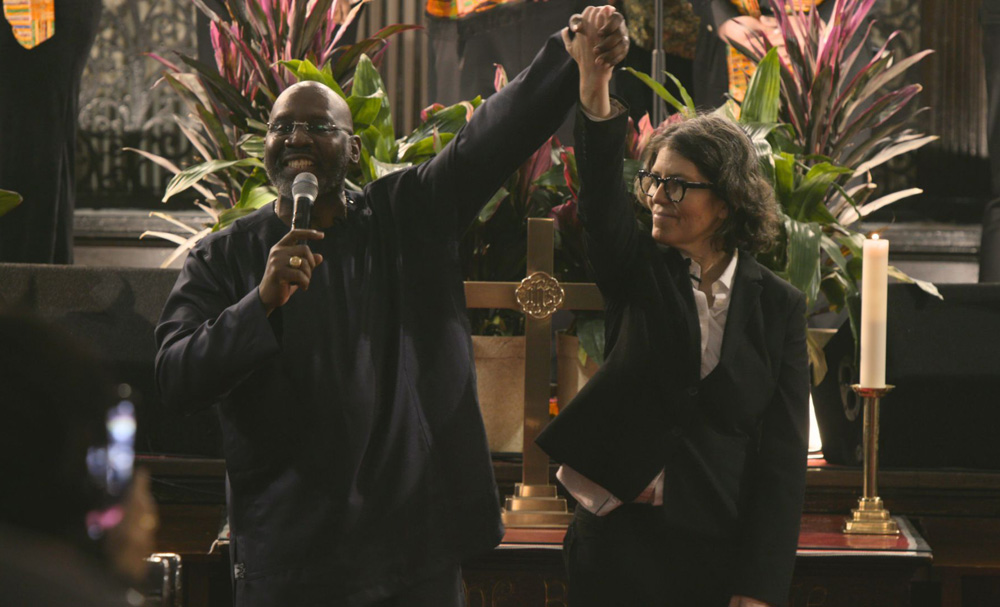At one point in “All God’s Children,” Rabbi Rachel Timoner is describing all the ingredients necessary for a proper Passover seder plate, noting the inclusions of items both sweet and bitter per Jewish custom to accurately reflect all the experiences of life. Generally there are herbs to fulfill the role of the bitter while apples or some variation thereof can erase the bad taste from the mouth, but this year will be different at Congregation Beth Elohim in Park Slope, Brooklyn when explaining all this to parishioners from the Antioch Baptist Church from just a few blocks away is part of a larger conversation she’s trying to facilitate between the two religious centers that have long been a backbone for their respective communities yet Timoner would like to see them come together as the pillar for something even broader.
As easy and organic as it appears to be to put sweet potatoes and collared greens on the Seder plate per the request of Rev. Dr. Robert Waterman, the pastor at Antioch, the superficial gestures that take the least amount of effort have a way of obscuring the truly meaningful ones that need to occur for a true partnership to be had in the film, which covers three years of the Jewish and Christian congregations attempting to get a better understanding of one another. Their differences aren’t limited to how they worship as Timoner’s sister Ondi (“Last Flight Home”) finds, with deep divisions owing more to a lack of trust as the predominantly Black congregation of Antioch has long made to feel as if they don’t belong in the community with the church somehow holding strong over a century, but under constant threat that hasn’t abated in the gentrifying neighborhood where a horrific practice known as deed theft, in which the elderly are tricked into signing away their homes, remains completely legal and primarily associated with Hasidic Jews.
Although it’s sad to think at first the most apparent common ground that the two share is a sense of persecution, as Rabbi Timoner’s efforts are encouraged in part by a rise in antisemitic attitudes she only needs to look outside her synagogue to see expressed in graffiti, it is a powerful motivator for herself and Rev. Dr. Waterman to share a belief that there’s strength in numbers. Timoner, the director, is curiously positioned for the chaos that follows, no stranger to detailing the messy process of people attempting to coexist with one another whether it was following the rivalry of the Brian Jonestown Massacre and the Dandy Warhols in “Dig!” or as part of the early Internet, “Big Brother”-like experiment in “We Live in Public,” yet given to a bit of bombast when it comes to presenting pressing social issues in such films as “The New Americans: Gaming a Revolution” and “Cool It,” where montages from the situation outside the one she’s covering can become a bit abrasive. While Rabbi Timoner and Rev. Dr. Waterman can appear to be walking on eggshells in trying to lead their flocks to somewhere they know will be better for all involved without knowing how to get there, the film is more confrontational for better or worse in its deliberate edits and raw camerawork, occasionally looking as if it’s out of sync with the delicate conversations that are unfolding.
Having the camera around, however, is clearly valuable when “All God’s Children” inevitably picks up on the blind spots that the film’s subjects have as they try to achieve a connection. One of the film’s strongest observations is also among its quietest when Rabbi Timoner comes to realize that her white privilege allows her to express anger publicly while Rev. Dr. Waterman cannot and the film itself shows her debating whether to walk out of an Easter Pageant at Antioch that depicts the crucifixion a la “The Passion of the Christ” while only later Dr. Waterman can abstractly refer to the times he wanted to walk out on their bridge-building efforts out of frustration. Although there are tactile accomplishments reached by the pair, such as when they team up on a political effort to make deed theft illegal, the sense that the film could aid even those involved in it recognize the less obvious places where they see things differently, let alone anyone trying to build coalitions in their own communities from different cultural backgrounds, comes across as consequential as any other and while “All God’s Children” has to end on a note that there’s still work to be done, it’s heartening how its mere existence should actively contribute to that work.
“All God’s Children” will be available to screen virtually from November 15th through December 1st via the DOC NYC online platform.




